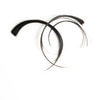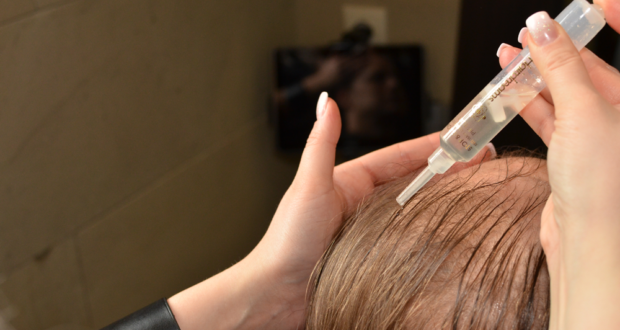|
7/12/2019 Brush out the problemAs hair loss has no age limit, it can be embarrassing for clients (that's you) to cope with – we spoke to industry professionals who reveal what signs to look out for, tips on managing the problem and how to avoid any hair loss at all. Leading trichologist Sally-Ann Tarver from The Cotswold Trichology Centre has plenty of experience at the cutting edge of diagnosis, treatment and advice on all aspects of hair loss and scalp problems. Sally told us it is estimated that one in four women suffer with hair loss and over half of men suffer significant hair thinning before the age of 40. She said: “Today I notice that a lot more people are becoming open to talking about hair loss, especially since the growth of the internet and social media. It is becoming easier for us to seek help, find out what we can do and to talk about it with trained professionals, supportive friends and family. “When I began in Trichology, I did so because I recognized there were so many people suffering with hair loss who didn’t know where to go or what to do if they noticed something wrong. Most people would just speak to their hairdresser and it often felt like a much more of an embarrassing and sensitive subject back then. As no one really talked about it, anyone who suffered from hair loss thought they were in the minority as the issue was not as widely discussed and accepted as it is today.” Sally provided us with the first 6 signs of hair loss and her top 6 tips on how to deal with these: 6 signs of hair loss:
6 ways on how to deal with hair loss:
International brand Hairdreams specialise in professional hair lengthening and thickening systems. They told us that in line with the increasing average age of the population, the number of women and men suffering from hair loss is growing as well. According to recent studies, every other salon client currently suffers from hair loss already. Hairdreams is already very familiar with this growing segment and the client concerns with hair loss. In the face of enormously growing demand in this sector, Hairdreams has been working on innovative solutions for more hair volume for many years.
Hairdreams’ technical advisor and trainer Sarah Sullivan told us most of the world-wide population will lose more hair than they ever imagined and will need professional services to help them restore their hair. She said: “Many people are unaware of the treatments and systems available to them, so awareness is key.” Sarah explained that hair loss is a problem in both males and females and that diet – lack of vitamins required to aid hair growth, stress and the pressures of life in today’s current climate are all responsible for the problem. We asked Sarah if she sees hair loss as a problem only amongst the older generation or is it varied, to which she told us: “Both male and females are losing hair at a much younger age due to many environmental factors. The main reason stems from genetically predisposed hair loss and other influencing factors are stress, illness and malnutrition just to name a few. In all of these cases, the hormone DHT (Dihydrotestosteron) which is produced by our body causes the active roots to become dormant which decreases the production of growth.” Hairdreams Stop & Grow and Microlines system is targeted at both male and females of any age, from 18 to 80 who are suffering from various types of hair loss. For your clients to look after their hair as much as possible to try and prevent thinning/loss, Sarah suggested: “They should eat a well-balanced, healthy diet. Take supplements including vitamin B12, Iron and vitamin D, use good quality, professional hair care products to care for their hair and scalp and a good quality brush is important and always brush from the ends working your way to the roots to avoid breakage.” Iain Sallis is one of the leading Trichologists in the UK. He is the director of the Hairmedic Trichologly clinics and co-founder of the International Trichology Congress. We picked his brain on hair, hype, health and the right hairbrush! According to Iain, 1:3 of women suffer from hair thinning at some point in their life (diffused shedding or a general diminishment of the hair volume). Approximately 40% of women will suffer from a genetic form of hair thinning after the menopause. Iain told us that he doesn’t think the problem is increasing: “I think we are becoming more aware of hair loss and we are at a position where there is more to help, so people will complain about it more. So, it’s not increasing, just a greater amount will seek treatment.” Iain revealed that his clinic demographics show the main complaints for hair loss in men happen in their 20s and for women he has equal numbers of females in every decade from their 20s all the way to their 70s. He said: “For women it doesn’t matter when it happens, hair loss is devastating. For men, there is a tailing off in the 30-40s where there is a resignation and an acceptance that they are going thin on top.” Iain gave us some tips for those in the early stages of hair loss: Get a diagnosis and seek advice from your GP, dermatologist or registered Trichologist. Iain said: “Hair loss isn’t just ‘one thing’ it is a multi-faceted health issue and so you need to find out what it is and correct or treat that issue.” Iain spoke about Tangle Teezer’s new Fine & Fragile hairbrush which causes less stress and breakage on more fragile hair. He said: “This concept that you can ‘take care of what you have’ as part of the hair health regime is really important for the person with fine or damaged hair as they really try to do everything they can to help. If they are using the wrong brush daily (several times a day) this may cause unnecessary breakage and damage to the hair, inadvertently making their situation worse.” Hayley Jennings and Jessica Patrick, Co-Directors at Unlimited Hairloss Solutions, explained that the most common form of hair loss is Androgenetic Alopecia (male pattern baldness), a genetic condition which can commence in men at any age. However, they also added: “8 Million women in the UK suffer from hair loss and one in eight is under the age of 35.” Hayley and Jessica told us that a deficiency in certain nutrients and an imbalanced diet can lead to bad scalp health, poor hair growth, thinning brittle and damaged locks, and even hair loss. Jessica said: “Of course there are so many other factors that affect hair growth and can cause hair loss – from medical reasons to emotional factors – but it’s important to recognise the role that diet can play to and it is one of the things that we frequently discuss with our clients suffering from a range of hair loss symptoms at Unlimited Hairloss Solutions.” The co-directors touched on the fact that a vegan lifestyle (plant-based diet) has surged in popularity, with the number of vegans in the UK rising by approximately 360% over the past decade. Jessica and Hayley told us: “While there are many proven benefits to adopting a plant-based diet and removing certain animal-based products from a diet, cutting out major food groups can often have a negative impact on the hair’s overall health. For example, vegans sometimes fail to maintain a good balance of certain minerals such as zinc. Zinc is hugely important for hair growth, and a lack of it could lead to hair loss. We asked the directors at Unlimited Hairloss Solutions for tips they would offer to those who are in the early stages of hair loss. They explained: “If your client’s hair loss or thinning is not overly visible and is likely to be temporary, such as post-partum hair loss, you may wish to advise on a new cut or style that will help to hide the thinning areas. A change of colour can also be incredibly effective at disguising hair that has become finer. “You should also advise on any professional treatments they could try to help boost the condition of their hair in order to make it appear fuller, as well as which products to use in order to help the hair look thicker. If the loss is very visible, or shows no signs of slowing down, then a new style may not be enough to create the appearance of a fuller head of hair. In that case you may want to recommend that your client speaks to a hair loss expert for advice on hair replacement methods and techniques. This would be particularly advisable if you notice that your client is becoming affected emotionally by the situation.” Jessica and Hayley explained that as a result of the above, approaching the subject of hair loss with a client is something that shouldn’t be delayed. They said: “While it may be a sensitive subject, armed with useful information and the correct approach you will be helping your client step in the direction of hair restoration that can truly transform both how they look and how they feel. As their stylist, that should be your ultimate goal.” It is clear from the experts we have spoken to that there are varying figures on the amount of people suffering from hair loss. Importantly though, these figures show that it is an issue that needs to be addressed sooner rather than later and there are ways to combat and overcome it. As your clients’ most valued advisor when it comes to their hair, you have a duty to know the tell tale signs of hair loss and advise them accordingly. This article is from The Salon Magazine Hair by Brian - The Beauty Blog
Comments are closed.
|
Hair by BrianMy name is Brian and I help people confidently take on the world. CategoriesAll Advice Announcement Awards Balayage Barbering Beach Waves Beauty News Book Now Brazilian Treatment Clients Cool Facts COVID 19 Health COVID 19 Update Curlies EGift Card Films Follically Challenged Gossip Grooming Hair Care Haircolor Haircut Hair Facts Hair History Hair Loss Hair Styling Hair Tips Hair Tools Health Health And Safety Healthy Hair Highlights Holidays Humor Mens Hair Men's Long Hair Newsletter Ombre Policies Procedures Press Release Previous Blog Privacy Policy Product Knowledge Product Reviews Promotions Read Your Labels Recommendations Reviews Scalp Health Science Services Smoothing Treatments Social Media Summer Hair Tips Textured Hair Thinning Hair Travel Tips Trending Wellness Womens Hair Archives
May 2025
|
|
Hey...
Your Mom Called! Book today! |
Sunday: 11am-5pm
Monday: 11am-6pm Tuesday: 10am - 6pm Wednesday: 10am - 6pm Thursday: By Appointment Friday: By Appointment Saturday: By Appointment |


 RSS Feed
RSS Feed